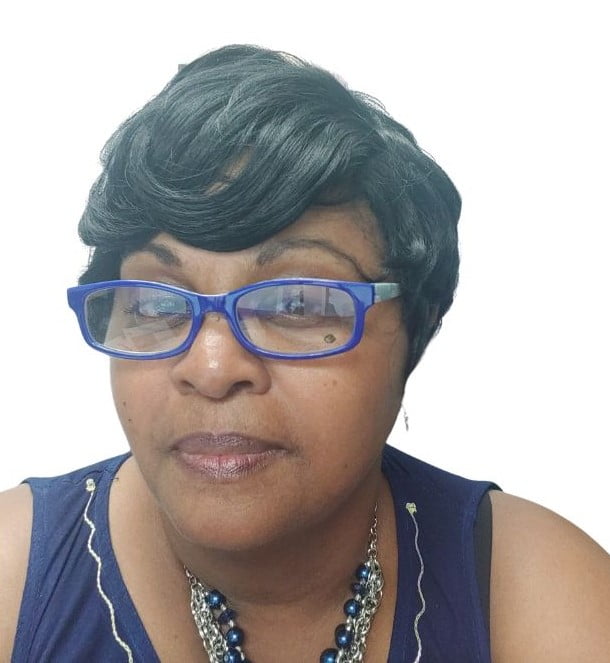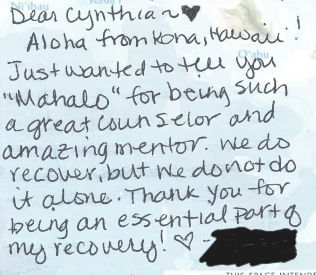
What does it take to be an SUDP?
The Straightforward Answer
According to the Washington State Department of Health website, a Substance Use Disorder Professional certification requires completion of an associate degree with at least 30 college credits of substance use disorder related classes and 2,500 hours of counseling under supervision, or a bachelor’s degree and 2,000 hours of counseling under supervision. Once this is done, a trainee (an SUDP/T) can take the exam to become certified as a Substance Use Disorder Professional.
A Real-World Answer
However, according to Cynthia Brady, who recently passed the exam and earned her SUDP certification, it requires more than education, experience, and exam to be successful at counseling people who are struggling with SUDs. In a word, it requires compassion.

Compassion Over Knowledge
Cynthia says the importance of the principle Do no harm is one thing that has stood out to her in her training, in counseling, and in every aspect of life. She says, “the clients really don’t care about how much we know. They want to know how much we care about them getting clean and sober or helping them get their life back on track.”
Her clients find her tough, but fair, and it’s obvious that they know she cares because they send cards and letters back saying things like “Cynthia has an innate ability to connect with her clients,” and “Thank you for being an essential part of my recovery!”

Knowledge of Barriers
One of the reasons that Cynthia is able to connect so well is her hyper-awareness of the barriers her clients face. She says that, while people do choose to use substances, no one sets out to make a career out of having a substance use disorder. Leaving that life behind comes with many challenges, though.
Many clients struggle to get the legal system and the community to see them as individuals with issues rather than a stereotype or a case number. But Cynthia does see them, and she believes that it’s critical for their stories to be heard.
“We don’t need to make judgments without knowing what people came from, where they came from, what kind of pain they suffered through, the traumatic experiences they’ve been through, and how it’s affected or impacted their self-esteem, their self-worth, and even their ambition.”
Lived Experience and Education
Cynthia has turned her own story into one that inspires.
She grew up with numerous barriers, suffered from an SUD, and then overcame many challenges in her path to get clean and sober. She went through a drug court program, and while doing that, she went back to school, earning an associate degree in human services, and then a bachelor’s in ethnic, gender and labor studies.
Even when she didn’t have a clear career path lined out yet, she knew one thing: “All my life, I’ve been passionate about helping people,” she says. From volunteer work feeding unhoused and disadvantaged people to serving as the president of the ushers’ board at her church, she is dedicated and active in giving back to the community.
A Place to Start
With some guidance and assistance from a helpful employee at WorkSource, Cynthia decided to become an SUDP. However, as in many new fields, the challenge at the beginning is that you need experience to get a job, but you need the job to gain experience.
In Trainee status, people who are starting their supervision hours to become a Substance Use Disorder Professional have to work alongside their supervisor for 50 hours before they can start seeing clients and working independently. “Everyone doesn’t give you a chance to get your first 50,” Cynthia says. “I said whoever gives me my first 50 hours will end up with me as a loyal employee. Well, West Sound Treatment Center gave me my chance to get my first 50.”
When Cynthia started leading the group sessions as an SUDP/T at the Poulsbo office, “something just clicked,” she says. She recalls that, back when she was in treatment, she’d had dreams of standing before groups, talking to people. “That was when I felt GOD speak to my spirit and say, ‘Hey. This is where you’re supposed to be.’”

Barriers to the SUDP Exam
A few years later, with her supervision hours completed and the end of her Trainee status in sight, Cynthia put off the test for a while. Some of her reluctance to schedule it stemmed from test anxiety, although she recognized that she has gained so much knowledge of the profession from the SUDPs who have worked with her during her time at WSTC.
That fear wasn’t the primary barrier keeping her from taking the test, though. “At the time I was trying to ‘get my P,’ I was going through an emotional time, as well,” she explains. Her cousin, who was also her close friend, was in the hospital fighting for her life on the day she took the test. Cynthia had been driving back and forth to the hospital after work for weeks.
Passing the exam was eclipsed by the loss of friends, and further losses of family and church members since then have made it hard to process and enjoy the prestige of her accomplishments.
Praise for Achievements
The hearts of her co-workers are with her during this difficult time. And WSTC highly esteems the weight of her accomplishments achieved despite so much adversity. CEO Ken Wilson says, “In the four-and-a-half years I have worked with Cynthia, she has become a very valuable member of the team. She loves her work, her people, and is a strong leader with her peers. No one could have more passion and dedication to this field than Cynthia. It shows in all areas of her work. I find it a great privilege to work with Cynthia and look forward to many more years of service.”
If Washington’s Department of Health included a requirement for SUDP/Ts to display compassion like Cynthia’s before a certification was granted – as well as the training, knowledge, and experience already required – people with SUDs in this state would be guaranteed truly excellent service.

